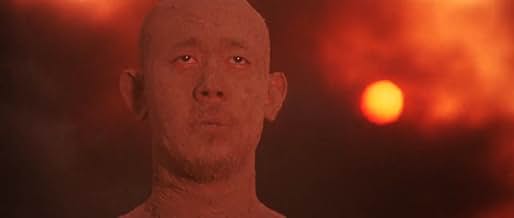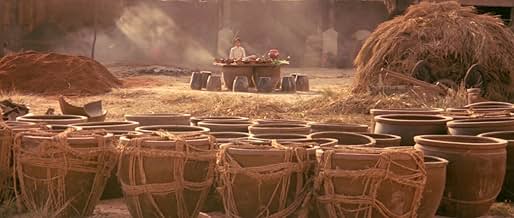IMDb रेटिंग
7.3/10
10 हज़ार
आपकी रेटिंग
1930 के दशक में जब चीन के एक कुष्टरोगी वाइनरी मालिक की मृत्यु, उसकी अरेंज मैरिज़ के कुछ दिनों बाद हो गई थी, तब उसकी युवा विधवा को डाकुओं, उसके शराबी प्रेमी और हमलावर जापानी सेना का सामना करत... सभी पढ़ें1930 के दशक में जब चीन के एक कुष्टरोगी वाइनरी मालिक की मृत्यु, उसकी अरेंज मैरिज़ के कुछ दिनों बाद हो गई थी, तब उसकी युवा विधवा को डाकुओं, उसके शराबी प्रेमी और हमलावर जापानी सेना का सामना करते हुए उस वाइनरी को चलाने के लिए मजबूर होना पड़ा.1930 के दशक में जब चीन के एक कुष्टरोगी वाइनरी मालिक की मृत्यु, उसकी अरेंज मैरिज़ के कुछ दिनों बाद हो गई थी, तब उसकी युवा विधवा को डाकुओं, उसके शराबी प्रेमी और हमलावर जापानी सेना का सामना करते हुए उस वाइनरी को चलाने के लिए मजबूर होना पड़ा.
- पुरस्कार
- 17 जीत और कुल 7 नामांकन
Rujun Teng
- Wo Luohan Yeye (Uncle Luohan)
- (as Rujun Ten)
फ़ीचर्ड समीक्षाएं
The much heralded renaissance of New Chinese Cinema can be an acquired taste to many Western filmgoers, but this handsome period piece (directed by the cinematographer of 'Yellow Earth', 1984) is livelier and more accessible than most. Part folk tale, part historical drama, it tells the story of a young virgin (sold by her father into marriage with a wealthy leper, in return for a mule), who after her husband's mysterious death continues to run his successful vineyard, with help from her loyal wedding bearers. And yet for all its undeniable physical beauty and colorful action the film can be a dry experience, at least until the outbreak of the second Sino-Japanese War in the 1930s. With the Japanese occupation some emotional urgency finally breaks through the film's mantle of reserve, which up to that point had marked even the more bawdy episodes of communal singing and drinking.
There are several versions of this film available on video. Some are in wide screen, some aren't. The impact of the visuals is lost without the full-shot wide screen. Then there are two different subtitled versions, one that has large subtitles and another that uses smaller but less intrusive subtitles, which is the best of the two. So depending on what version of the video you're watching, your experience of the film can vary. But assuming you get your hands on the good version...
This film is like a quiet fairy tale that transforms into something that I didn't see coming. The visuals are stunning. The story slowly unfolds but is presented so well that it's completely compelling. The acting is as good as it gets. And the ending hits you like a punch in the stomach.
This films stands out from all other Chinese films I have seen. It has a character uniquely its own, and is well worth seeking out.
This film is like a quiet fairy tale that transforms into something that I didn't see coming. The visuals are stunning. The story slowly unfolds but is presented so well that it's completely compelling. The acting is as good as it gets. And the ending hits you like a punch in the stomach.
This films stands out from all other Chinese films I have seen. It has a character uniquely its own, and is well worth seeking out.
This film captures the Chinese landscape with a touch of love, love that the filmmakers had for their people and their culture which fuses with the sorghum fields and the folk songs they sing when they are happy or when they are in pain and anguish, beautifully. I felt the Japanese effect or the tyrannical force with which they subdued the Chinese should have been shown a little more, it all happened in a jiffy. The storytelling is pretty but fails to connect on many levels. Like the transition of a poor village girl into a strong distillery owner and the level of trust and love she is shown by the workers and the sudden infatuation that develops and is accepted between her and Yu. Also the way we are shown the attack sequence was not at all engaging, it only had slow-mo shots of people falling/running but the final shot of redness surrounding Yu and his son was brilliant. Watch it, for you'll get a peek into Chinese culture, the position of women in it, their traditions and songs and most importantly the red wine, red like blood mingling to mark a jarringly tough Chinese wartime life.
Credit goes to Yimou for stripping this epic 2 novel series down to this spare and gorgeous little hour and a half. For all the recent fantastic forays into Chinese fantasy, this story (which is allegedly true) shown as it is, is as close to a fairy tale as it gets, at least until the very end. Every shot is a painting. For some reason this film is still near-impossible to find on DVD. I truly hope it is not being suppressed for anti-Japanese sentiment expressed in it. That would be a terrible shame. This film was released shortly before Tienanmenn (sp) and it has a boldness and frank humor rarely seen in Chinese film since.
Red Sorghum. Red is for blood. Blood/Wine coursing through your veins. Blood Pumping Love in your heart and Courage as well. Blood of your loved ones killed in war. Blood of your enemies. Blood of your Brothers. I get it now. I remember his masterful use of color. Just like how he retells the stories in different colors for "Hero". This is how I felt after watching "Red Sorghum."
Gong Li is stunning as usual. Check out Zhang Yimou as Brother Lohan. He displays such dignity. Muscle Man quite often steals the show with his bravado. The songs are uplifting and beautiful to hear. The scenery takes you away and the fields of sorghum are alive and pulling you in like Nature Herself.
While gutwrenching like his other movies, the characters in this one are especially endearing in their loyalty to each other. What more can I say. Poetry brought to life.
Gong Li is stunning as usual. Check out Zhang Yimou as Brother Lohan. He displays such dignity. Muscle Man quite often steals the show with his bravado. The songs are uplifting and beautiful to hear. The scenery takes you away and the fields of sorghum are alive and pulling you in like Nature Herself.
While gutwrenching like his other movies, the characters in this one are especially endearing in their loyalty to each other. What more can I say. Poetry brought to life.
क्या आपको पता है
- ट्रिवियाThe films screenplay was based on the novel of the same name by Chinese author Mo Yan. In 2012, Mo Yan was awarded the Nobel Prize in Literature. The Swedish Academy awarded him the prize as an author "who with hallucinatory realism merges folk tales, history and the contemporary".
- कनेक्शनFeatured in The Turandot Project (2000)
टॉप पसंद
रेटिंग देने के लिए साइन-इन करें और वैयक्तिकृत सुझावों के लिए वॉचलिस्ट करें
- How long is Red Sorghum?Alexa द्वारा संचालित
विवरण
बॉक्स ऑफ़िस
- दुनिया भर में सकल
- $1,08,371
- चलने की अवधि
- 1 घं 31 मि(91 min)
- ध्वनि मिश्रण
- पक्ष अनुपात
- 2.35 : 1
इस पेज में योगदान दें
किसी बदलाव का सुझाव दें या अनुपलब्ध कॉन्टेंट जोड़ें













